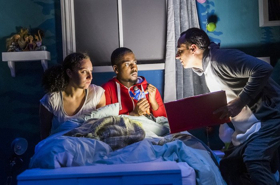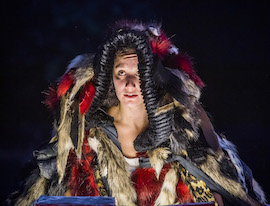Guest Blog: Director Kirsty Housley On PHILIP PULLMAN'S GRIMM TALES

It's dark in the theatre. Really dark. We asked the producers, the Unicorn Theatre, to cover the emergency exit lights for this lighting cue, so it's a total blackout.
The noise is instant and loud and I don't know what it says about me that I'm pleased, because what's making the noise is the children sitting all around me in the auditorium. Hundreds of children. And they're screaming. Loudly.
It's our first preview, and I've never made a show for children before, so I'm nervous. Will they be bored? Will they be too scared? Not scared enough? Is lots of screaming a good sign or a bad one?
I'd been warned that total blackout = hysteria, but I can't quite get over it. Their reactions are huge and sometimes make me laugh out loud and sometimes make me a bit emotional. Our set gets whoops and a round of applause. A lighting effect gets gasps, music makes them dance in their seats, bits of the story are commented on as we go.
It's hard to watch the show objectively with all this going on. They cry, they scream, they laugh, and all the time their reactions tell me more about the show I've made than an extra week in rehearsals would.
.jpg)
I learn a lot about this show we've made, very quickly. I learn that a section of storytelling I was convinced was dark, atmospheric and visually stunning is actually unintentionally hilarious (the auditorium erupts with laughter). I learn that some bits of the show still aren't clear (children can be heard loudly saying that they don't know what's going on), and I learn when it flies and when it doesn't.
All of this is normal for previews, of course, but this is different because I'm not learning by myself, I'm being told, with a kind of clarity that most theatre directors can only dream of possessing. I also learn that children are forgiving and tend not to value judge. Despite my unintentionally hilarious sequence, they proclaim it "Really good!".
I am starting to understand why Peter Brook liked showing work to children, saying: "An audience made up of children is the best of critics; children have no preconceptions, they are interested immediately or instantly bored, and they either go along with the actors or they get impatient."
I get this.

But I also feel a responsibility to the children. What are we telling them? Making them scream is one thing, but we really thought hard about what these stories mean, what they say to us today, and why we still tell them in 2018.
We carefully selected ones that speak directly to childhood. Most are about some kind of parental letdown (often something horrific like murder or banishment), as a result of which the children have to make their own way into the woods, learning how to navigate the threats they will face by themselves.
And that, ultimately, is the message. At some point, you have to do things by yourself. Red Riding Hood doesn't get into trouble because she steps off the path. She gets into trouble because she hasn't learned how to deal with lone wolves yet. Which she will in time.
So perhaps the fear and screaming is a good thing. The first step to feeling afraid and learning to cope with that. And I hope that once the screaming subsides, that these stories will be enjoyed, and that our audience finds in them a message of empowerment.
Philip Pullman's Grimm Tales at Unicorn Theatre until 6 January, 2019
Find more Christmas theatre recommendations here!
Comments
.png)
|
.png)
|
Videos

